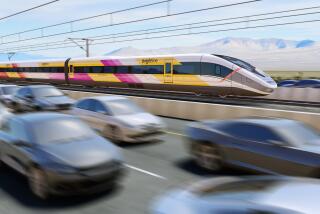French Riding High on a Fast Train Through Texas : Transportation: A decision to go with the high-speed TGV system over German competition has Gallic spirits soaring.
- Share via
PARIS — Three French workers hunched over their potent licorice-flavored pastis cocktails recently in the corner bar of a Paris suburb. They were depressed that France’s top soccer team from Marseilles had lost in the European Cup final to a team from Belgrade, Yugoslavia, the night before. The mood remained glum until one of the men, Didier Debaud, 37, a moving company laborer, perked the place up with the best news of the times:
“At least we sold the train to Texas.”
France’s economy is on a slide, unemployment is mounting and the Marseilles Olympia soccer club blew its game with Red Star of Belgrade.
But the decision of a Texas panel in favor of the French high-speed train system TGV (train a grande vitesse) over German competition late last month has kept French spirits from derailing.
The choice of the $5.8-billion French high-speed rail system linking Dallas, Houston and San Antonio has filled workers with visions of the kind of Texas-size riches they see on reruns of television’s “Dallas.”
Debaud, for example, hopes the France-Texas rail linkage will bring more opportunity for his five children. He said he was glad that he had given all of his kids American names (John, Jennifer, Morgan, Kelly, Karen), all gleaned from the imported U.S. soaps.
In fact, the Texas High Speed Rail Project still faces some difficulties before it can be put on track, with a scheduled Dallas-Houston completion date of 1998. Under pressure from the Texas intercity carrier, Southwest Airlines, the Texas Legislature stipulated that no public funds could be used to finance the rail project.
The Texas TGV consortium of French, American (construction giant Morrison Knudsen) and Canadian (Bombardier) firms proposed that the project be financed with a combination of stock issues and industrial bonds.
But a change in U.S. federal law will be required first, since the bond amount exceeds the dollar ceiling established for such issues by Congress. The bonds would be guaranteed by French banks Credit Lyonnais and Banque Indosuez. The losing German-American consortium proposal required $1.7 billion in public funds, a critical factor that many felt led to its rejection.
French officials are aware of the financial risks they face in undertaking the massive public works project without government subsidies.
“It is a great moment for Texas and France,” said Michel Gurniki, director of North American projects for Sofrerail, the French railroad research wing that put together the Texas bid. “But we know it is only the beginning of a difficult story. We are in the same position we were with Eurotunnel (the Anglo-French English channel project) 5-6 years ago. We have a big project. Now we need to find the money.”
But winning the first major international competition for high-speed rail systems also has given France new confidence in the global railroad battle with Germany and Japan, both of which have their own high-speed systems to market. Important contracts are expected in the next two years for Korea, Taiwan and Canada.
In announcing the May 28 selection, Bob Neely, Texas High Speed Rail Authority executive director, said TGV won the contract because of its “high experience level--nine years with no fatalities, millions of passengers and outstanding technology that is environmentally sound.”
France has run its highly successful TGV service (averaging 180 miles an hour) between Paris and Lyon since 1982.
The fastest passenger train operating in the United States is the 125-m.p.h. Amtrak connecting Washington, D.C., New York and Boston.
The TGV has helped France overcome its long-held image as a nation of bon vivants more accomplished at viticulture and haute couture than high-tech.
But an article in the slick newsmagazine Paris Match last week suggested that some of the older French charms may have played a role in seducing the Texans. On their last visit to France a year ago, the nine members of the Texas High Speed Rail Authority’s board of directors and their spouses were treated to a dinner-dance on a luxury cruise of the Seine.
Just as the boat passed by the miniature Statue of Liberty on an island in the river not far from the Eiffel Tower, a singer with the orchestra broke into “New York, New York” and a magnificent display of fireworks erupted over the Paris skyline.
“The Texans were all standing and cheering,” Paris Match said.
More to Read
Sign up for Essential California
The most important California stories and recommendations in your inbox every morning.
You may occasionally receive promotional content from the Los Angeles Times.













